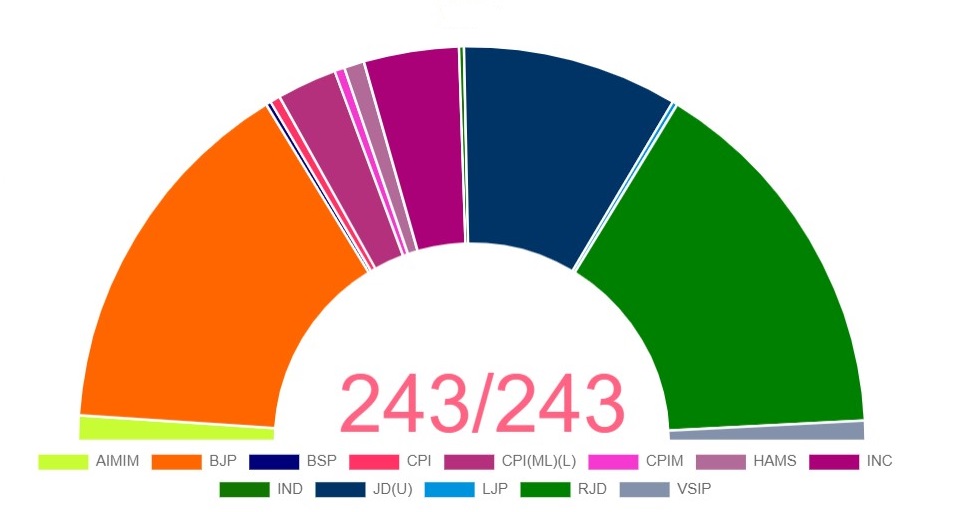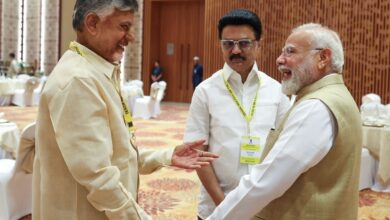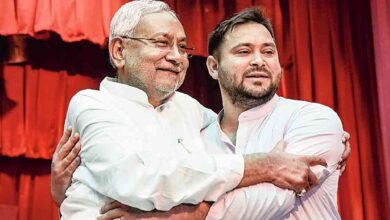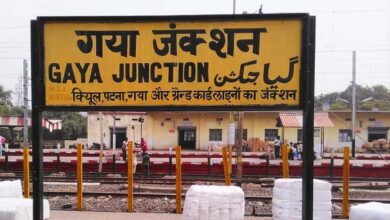
By Gyanendra Kumar Keshri
Proving almost all the exit polls wrong, the National Democratic Alliance (NDA) led by Nitish Kumar has emerged winner securing 125 seats in 243-member Bihar Legislative Assembly.
The NDA’s victory is powered by Bharatiya Janata Party (BJP), which won 74 seats, while Nitish Kumar’s Janata Dal (United) was restricted at 43 seats. The other two alliance partners Hindustan Awaam Party (Secular) and Vikassheel Insaan Party won four seats each, taking the tally to 125. This is just three seats more than the requisite 122 majority mark needed to form the government in the state.
Prime Minister Narendra Modi’s popularity seems to have helped NDA retain power despite fatigue and anti-incumbency factor against Chief Minister Nitish Kumar. The NDA, particularly BJP, performed exceedingly well in the region where Modi addressed election rallies.
“The popularity of Modi seems to be a stable factor in the BJP’s electoral politics. So much so that he has transformed into a brand. Like a brand, he can be used in any state, any context and against any competition,” Suhas Palshikar, chief editor of Studies in Indian Politics, wrote in an opinion piece.
Nitish Kumar is set to become chief minister of Bihar for the fourth straight term as he was projected as the joint CM face of NDA during the poll.
Even though the BJP has got the upper hand with victory in 74 seats, Nitish Kumar is set to become the chief minister again. BJP’s senior leaders reiterated their commitment of making government under Nitish Kumar’s leadership despite winning substantially higher number of seats.
“Nitishji will remain CM as it was our commitment. There is no confusion on this,” said BJP’s senior leader and Deputy Chief Minister Sushil Kumar Modi.
“Nitishji will remain CM as it was our commitment. There is no confusion on this,” said BJP’s senior leader and Deputy Chief Minister Sushil Kumar Modi.
Modi also reiterated that BJP and JDU remain equal partners and there was no question of playing big brother role for any party. “In an alliance, not all parties win equal number of seats. Who won how many seats is irrelevant, people voted for NDA. BJP played a role in JDU’s victory and JDU played a role in BJP’s victory,” Modi added.
BJP’s Bihar unit chief Sanjay Jaiswal also reiterated his party’s commitment to form the government under Nitish Kumar’s leadership. “There is no doubt Nitish Kumar is our chief minister, this is no question of a rethink,” Jaiswal said.
On the question of BJP getting ‘big brother’ role, Jaiswal said, “there is no question of a junior or senior partner in an alliance.”
This is for the first time that BJP bagged more seats than JDU. Although the BJP is likely to honour the pre-poll commitment to make Nitish Kumar CM again, the power equation among the NDA partners would definitely go for a change.
This is for the first time that BJP bagged more seats than JDU. Although the BJP is likely to honour the pre-poll commitment to make Nitish Kumar CM again, the power equation among the NDA partners would definitely go for a change.
A big contributor for this change in the balance of power is Lok Janshakti Party’s Chirag Paswan. Although Paswan’s party managed to win just one seat it caused huge damage to JDU and believe to be the reason for its defeat in around 35 assembly constituencies. LJP contested on 143 seats.
Rashtriya Janata Dal (RJD) managed to retain its status as the single-largest party with victory in 75 seats.
Tejashwi Yadav-led Mahagatbandhan or Grand Alliance, which was projected to win as per most of the exit polls, managed to win 110 seats, 12 short of the majority mark. However, the good news for Lalu Prasad Yadav’s son Tejashwi Yadav is that his party Rashtriya Janata Dal (RJD) managed to retain its status as the single-largest party with victory in 75 seats. Congress party, which contested on 70 seats, managed to win only 19 seats. The Left parties, which had contested 29 seats, registered victory in 16 seats, with the CPI (ML-Liberation), winning 12 of them.
During the election campaign Prime Minister Modi had repeatedly said that Nitish Kumar would be the chief minister if NDA voted back to power. In fact, ahead of the third and final phase of polling Modi wrote an open letter to the people of Bihar saying he needed Nitish Kumar government to continue the development work in the state.
“I need Nitish Kumar’s government in Bihar to ensure that the state’s development is not derailed and that it doesn’t fall short,” Modi wrote in the letter.
This was perhaps the toughest election for Nitish Kumar. The campaigning for the polls was fierce and unrelenting.
Party-wise Performance
| Serial No | Party Name | No of Seat Won | Vote Share (percent) |
| 1 | Rashtriya Janata Dal | 75 | 23.11 |
| 2 | Bharatiya Janata Party | 74 | 19.5 |
| 3 | Janata Dal (United) | 43 | 15.4 |
| 4 | Indian National Congress | 19 | 9.48 |
| 5 | Communist Party of India (Marxist-Leninist) (Liberation) | 12 | |
| 6 | All India Majlis-E-Ittehadul Muslimeen | 5 | 1.24 |
| 7 | Hindustani Awam Morcha (Secular) | 4 | |
| 8 | Vikassheel Insaan Party | 4 | |
| 9 | Communist Party of India | 2 | |
| 10 | Communist Party of India (Marxist) | 2 | |
| 11 | Bahujan Samaj Party | 1 | 1.49 |
| 12 | Lok Jan Shakti Party | 1 | 5.66 |
| 13 | Independent | 1 | |
| 14 | Others | 0 | 18.85 |
| Total | 243 | ||





